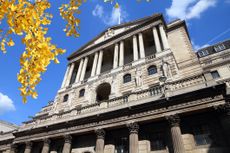What's the latest with UK mortgage rates?
Lenders are starting to cut mortgage rates following a better than expected drop in inflation in June. We assess the mortgage landscape, whether you’re a homeowner looking to remortgage or a buy-to-let landlord.


Some of the UK’s major lenders are cutting their mortgage rates after June’s lower than expected CPI inflation print, and the subsequent decline in the market’s long-term interest rate expectations.
HSBC was the first major lender to cut its rates last week, announcing the rates on several of its mortgage products would fall.
Nationwide, TSB and Barclays have followed, offering some much needed hope for mortgage holders who have seen fixed-rate deals go up nearly every day over the last few months.
Subscribe to MoneyWeek
Subscribe to MoneyWeek today and get your first six magazine issues absolutely FREE

Sign up to Money Morning
Don't miss the latest investment and personal finances news, market analysis, plus money-saving tips with our free twice-daily newsletter
Don't miss the latest investment and personal finances news, market analysis, plus money-saving tips with our free twice-daily newsletter
According to Moneyfacts, the average two-year fixed rate mortgage hit 6.86% on Wednesday, but by Friday they had fallen slightly to 6.81%.
It now stands at 6.85% as of 1 August.
The cuts by Barclays, TSB, HSBC and Nationwide as well as some smaller lenders could see average rates fall from here, says Sarah Coles, head of personal finance at Hargreaves Lansdown.
But does this mean mortgage rates will finally start to fall?
When will mortgage rates come down?
These cuts are good news for mortgage holders, but “this isn’t going to usher in an era of super-low rates”, says Coles.
“For major moves much below 6%, we can expect to have to wait for inflation to fall on a sustained basis and the Bank of England to be weighing up rate cuts – rather than just being likely to put them on hold this autumn,” continues Coles.
“However, it will be enough of a shift to make a material difference to remortgagers who were dreading the hunt to find a new deal – and some buyers who had been priced out of the market.”
The BoE is widely expected to hike rates this week, but it “may be able to pour some balm on the mortgage market by providing some soothing rhetoric that offers a chink of light at the end of the tunnel,” says Laith Khalaf, head of investment analysis at AJ Bell.
This is because fixed rates are determined by market forecasts of future interest rates, “so they can fall even while the main bank rate is still going up”, says Khalaf.
What is happening with mortgage fixed rates?
Many lenders have raised their mortgage rates, both in response to the base rate rising to 5% and in anticipation of a further increase in August.
Fixed-rate mortgage deals seem to have seen the biggest increases. A month ago, on the day of the latest Bank of England interest rate announcement, the average two-year fix was 5.49%. It has since surged to 6.85%.
Average mortgage rates appear to have decreased last Friday (28 July) when rates edged down slightly following the news that CPI index came in below expectations for June.
The best two-year mortgage rate for someone remortgaging is now 5.69%, while the best five-year fix is 5.20%, according to Moneyfacts. The best deals for a first-time buyer are 5.09% (two-year fixed) and 5.57% (five-year).
Those who have been on a variable rate waiting for a good time to fix might be wise to do it now, says Coles. “You will need to be comfortable with watching fixed rates fall further into next year, but you will have the certainty of a fix at a lower rate than we’ve seen for weeks.”
What about variable mortgage rates?
About 2.2 million homeowners are on variable-rate mortgages, which are tied to the BoE’s base rate.
Today’s average two-year tracker rate is 6.02%. This rate has remained the same for a few days now, which is unsurprising given tracker rates tend to change only once following an interest rate announcement. a
Homeowners on a standard variable rate (SVR) face the highest rates. As of 1 August, the average SVR was an eye-watering 7.85%.
What about buy-to-let rates?
Buy-to-let mortgage rates are slightly more expensive than deals for homeowners. Average rates are now pushing 7%.
According to Moneyfacts, the average two-year buy-to-let mortgage rate is 6.88%, and the average five-year rate is 6.72%.
The rates have fallen since Friday (28 July), when they were 6.97% and 6.82% respectively.
Higher mortgage rates for landlords are perhaps the final nail in the coffin leading many buy-to-let landlords to sell their properties. The number of homes in the UK available to rent is now at a 14-year low.
Mortgage support available
If you’re struggling to make your mortgage repayments, the good news is that lenders representing 90% of the mortgage market have signed up to the government’s mortgage charter. They include the big banks like Halifax, HSBC and Santander and building societies like Nationwide, Leeds and Skipton.
The charter is a series of support measures intended to help those in difficulty. Borrowers will be able to make a temporary change to their mortgage for six months to give them some breathing space, such as switching to interest-only payments or extending their mortgage term to reduce their monthly payments. Customers have the option to revert to their original term within six months by contacting their lender.
Meanwhile, there will be a 12-month delay before repossession proceedings can start against those who have missed payments.
Regardless of whether your lender has signed up to the charter, all lenders also have a range of measures in place for customers experiencing difficulties.
Should I overpay my mortgage?
If you’ve got some spare cash, overpaying your mortgage can be a good way to protect yourself before your mortgage deal expires and you have to remortgage at a much higher rate.
Our mortgage overpayment calculator shows how your monthly repayments will change and help you decide if it is worth it.
Join us at the MoneyWeek Summit on 29.09.2023 at etc.venues St Paul's, London.
Tickets are on sale at www.moneyweeksummit.com
MoneyWeek subscribers receive a 25% discount.
Ruth is passionate about helping people feel more confident about their finances. She was previously editor of Times Money Mentor, and prior to that was deputy Money editor at The Sunday Times.
A multi-award winning journalist, Ruth started her career on a pensions magazine at the FT Group, and has also worked at Money Observer and Money Advice Service.
Outside of work, she is a mum to two young children, a magistrate and an NHS volunteer.
-
-
 Bank of England raises interest rates to 5.25%
Bank of England raises interest rates to 5.25%The Bank has hiked rates from 5% to 5.25%, marking the 14th increase in a row. We explain what it means for savers and homeowners - and whether more rate rises are on the horizon
By Ruth Emery Published
-
 How to check for Premium Bonds
How to check for Premium BondsHave you misplaced a savings product from NS&I? Here’s how to check for Premium Bonds and cash in any unclaimed prizes
By Tom Higgins Published

